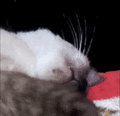Myoclonus facts for kids
Myoclonus is a quick, sudden twitching of your muscles that you can't control. Think of it like a sudden jerk or a hiccup! Sometimes, these twitches are completely normal and happen to healthy people. For example, if your leg suddenly jerks just as you are falling asleep, that's a type of myoclonus, and it's very common.
However, myoclonus can also be a sign of other health conditions, especially those affecting the brain and nervous system. It's a common symptom for people with epilepsy. Less often, it can be linked to other conditions like encephalitis (a brain swelling), tics (sudden, repeated movements or sounds), or certain rare genetic conditions. Some medicines, like certain pain relievers, can also cause muscles to twitch.
Contents
What is Myoclonus?
Myoclonus is a very fast, sudden muscle movement. It's like a quick, involuntary spasm or jerk. These movements can happen in just one muscle, a group of muscles, or even all over the body. They are usually very brief, like a lightning flash.
Why Do Muscles Twitch?
Our muscles move when they get signals from our brain through nerves. Myoclonus happens when there's a sudden, unexpected burst of activity in these signals, causing the muscle to contract quickly. It's like a short circuit that makes the muscle jump.
Types of Myoclonus
Myoclonus can be divided into different types based on why it happens.
Normal Myoclonus
This type is harmless and happens to almost everyone. You might not even notice it!
- Hypnic Jerks: These are those sudden body jerks you feel just as you're drifting off to sleep. Your body might twitch, or you might feel like you're falling. They are completely normal.
- Hiccups: Believe it or not, hiccups are a form of myoclonus! They are sudden twitches of your diaphragm, a muscle under your lungs, and the muscles between your ribs.
- Muscle Twitches: Sometimes, after a lot of exercise or if you're tired, a small muscle might twitch for a bit. This is usually harmless.
Symptomatic Myoclonus
This type of myoclonus is a symptom of another health condition. It means the muscle twitches are a sign that something else is going on in the body, often related to the nervous system.
- Epilepsy: Myoclonus is very common in people with epilepsy. It can be part of a seizure, where the brain's electrical activity becomes abnormal.
- Other Conditions: Less often, myoclonus can be linked to conditions like:
* Encephalitis: This is when the brain becomes inflamed or swollen, often due to an infection. * Tics: While tics are usually repeated movements, some can be very quick and resemble myoclonus. * Certain Medicines: Some medications, especially those that affect the brain or nervous system, can cause myoclonus as a side effect.
When to See a Doctor
If you experience muscle twitches that are frequent, strong, or interfere with your daily activities like eating, walking, or talking, it's a good idea to tell a parent or guardian so they can talk to a doctor. A doctor can figure out if the twitches are normal or if they are a sign of something else that needs attention.
Images for kids
-
Twitching whiskers in a sleeping cat
See also
 In Spanish: Mioclono para niños
In Spanish: Mioclono para niños
 | Jessica Watkins |
 | Robert Henry Lawrence Jr. |
 | Mae Jemison |
 | Sian Proctor |
 | Guion Bluford |


